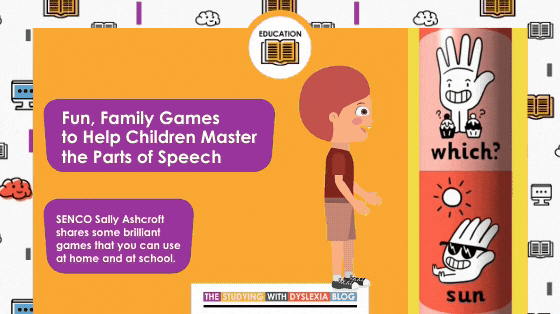Nouns, verbs, adjectives, adverbs…were there ever less descriptive or memorable words to describe the Parts of Speech our children need to master? In this article, SENCO Sally Ashcroft shares some great family games that can help with learning speech.
Nouns, verbs, adjectives, adverbs…were there ever less descriptive or memorable words to describe the Parts of Speech our children need to master? In my experience, most children (and many adults) get these muddled, not just dyslexic learners, and it’s easy to see why. The words themselves are fuzzy, ‘noun’ and ‘verb’ don’t sound like anything you can relate to, nor suggest their meaning, and with both having four letters, they often become interchangeable. If you master ‘verb’ then ‘ad-verb’ is a bit clearer, but what on earth is a ‘jective’?
Like all specialist dyslexia teachers, I need to invent games that genuinely help pupils remember tricky concepts. Here are three tried and tested ones that are fun too. They embed the most important parts of speech and simultaneously improve vocabulary and processing speed. The whole family can get involved and they need only take a few minutes. Remember to make learning as much fun as possible and allow your child several turns, you’ll be amazed how much they improve.
Firstly explain that there are over two million words in the English language, so, just as we categorise animals (birds, fish, insects, etc) we do the same with words, creating ‘word families’ depending on the job they do. Remind your child that almost everyone forgets the awful names of these word families but that these games will help – a lot!
1. Fast & Furious – 6 x 60 seconds naming.
Time each other naming as many of the given Parts of Speech in one minute. Watch the clip to see how to introduce each challenge and improve your score. Have multiple tries, reward great words and attempt with your eyes closed too. This is a huge favourite with the kids.
2. What’s What?
Lay out definitions of the Parts of Speech and put all the cut-out words in a hat/bag/box. Each person has 60 seconds to see how many they can put under the correct definition. Add your child’s topic words or spelling words to reinforce schoolwork.
3. Double Trouble
Some words belong to two word families, here is a lovely colouring activity that clarifies the difference. Once the concept is understood, spotting other examples in everyday conversation becomes easy. Click the ‘Double Trouble’ icon to the side to download all the information that you need.
About Sally Ashcroft
Sally Ashcroft is a specialist dyslexia teacher and one half of Handy Spelling, an award-winning stationery company launched in 2020 to help dyslexic learners.




